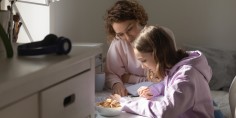Always keep family problems among family. Don’t ‘tell your business’ to outsiders.
These are common sayings in many families – especially if the ‘business’ in question concerns information a family member might find embarrassing. However, experts say when a child’s welfare is at stake, parents’ reluctance to seek help can be the difference between a problem addressed or a child endangered.
“There are a lot of norms in society that (say) we shouldn’t ask for help around parenting,” said Abby Wilson, director of community initiatives for Children’s Trust of South Carolina, a child advocacy organization. But “we know kids aren’t born with instruction manuals, and that families have a hard time. Every family struggles with, ‘Did I parent my child right in this situation?’
“So we’re really trying to change that narrative around it being OK to ask for help.”
Children’s Trust and other organizations are hoping to amplify that message in April, which is recognized nationally each year as Child Abuse Prevention Month. Through public awareness campaigns and an array of parenting programs and workshops, they hope to neutralize the stigma against asking for help.
One key tool in Children’s Trust’s arsenal is the Positive Parenting Program, a highly-regarded intervention also known as Triple P. Triple P offers a five-tier continuum of services to help caregivers. Level 1 includes community-wide marketing and publicity campaigns aimed at destigmatizing asking for help. At the other end of the spectrum, Level 5 includes referrals for intensive counseling.
Triple P, used around the world, boasts more than 35 years of research backing its effectiveness. With the Endowment’s support, Children’s Trust is implementing the program in Georgetown, Greenville and Spartanburg counties. The early goal is for the program, through its parenting classes and outreach tools, to reach at least 10 percent of the adult population in the three South Carolina counties.
The Endowment is also supporting efforts to implement the program in North Carolina, where it is working with Positive Childhood Alliance North Carolina (formerly Prevent Child Abuse N.C.) and state officials to implement the program. UNC-Chapel Hill’s Frank Porter Graham Child Development Institute is helping with the efforts in both states.
“The Endowment is proud to support the expansion of Triple P in the Carolinas,” said Phil Redmond, director of the Endowment’s Child and Family Well-Being program area. “As one of the most widely-known and heavily researched parenting programs in the world, it offers tremendous promise for helping parents and lowering child maltreatment rates.”
Children’s Trust officials say part of Triple P’s effectiveness rests in its flexibility; parents and other caregivers can get the specific level of help they need.
“If you’re coming to a Level 2 class and you’re saying, ‘Hey, I think I need more help,’ our practitioners are really good about finding a referral to the best fit for that caregiver,” said Mariah Kowalkowski, Triple P community capacity coach for Georgetown County.
Still, they realize many parents who could benefit never reach out. Triple P’s community-wide marketing campaigns try to counter the stigma by sharing positive messages about help-seeking via billboards, newspaper stories, Facebook ads and even “mommy blogger” influencers. Each community can tailor the messaging to fit its population; leaders can also use Triple P’s marketing campaign, called ‘Stay Positive.’
The program supplies caregivers with tools to keep small family problems or conflicts from growing into the kinds of complex and unstable situations where abuse and neglect occur. More than 22,000 children per year are found to be victims of maltreatment in North Carolina, according to the most recently available data from Child Trends, a national research organization focused on children’s welfare. In South Carolina, more than 14,000 children suffer maltreatment. National statistics show that in most cases, the victimizer is the child’s parent.
“One of the things that’s really important when you’re trying to move the needle on the prevention of abuse and neglect is to change the narrative around where abuse and neglect occurs,” Wilson said. “A lot of folks think abuse and neglect only happens in those families or those people ‘over there,’ and that’s not the case. It’s not for just parents that are involved in the system, or parents that are in trouble, or something along those lines.
“Anyone can stand to learn some more tips around parenting.”





